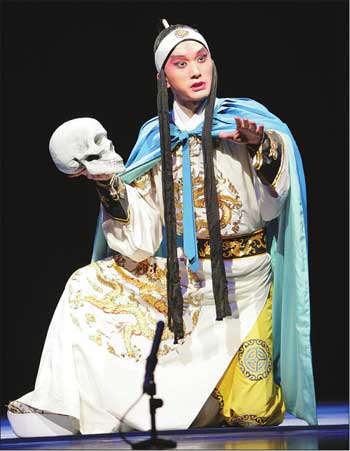当前位置: Language Tips> 双语新闻
【Cover Story】THE BARD IN BEIJING AND BEYOND
 |
| A Peking Opera version of Hamlet |
|
William Shakespeare was placed on a pedestal when his name first appeared in Chinese publications around 1839. Great scholars and artists have since made numerous attempts to bring the "Swan of Avon" to a Chinese-speaking audience. Although statistics are hard to come by, it's almost certain that he is the most translated foreign author and the most staged foreign dramatist. Shakespeare (1564-1616) who was born and died on the same date, April 23-now the UNESCO-anointed World Book Day-has been an inspiration for several generations of Chinese readers and theatergoers. (Spain's Miguel de Cervantes died on the same day April 23, 1616; and Tang Xianzu, arguably China's greatest dramatist and author of The Peony Pavilion, died in the same year.) While the Chinese only spotlight about a dozen of Shakespeare's plays, academic research tends to have a much wider focus. Most of the approaches are oriented toward discovering the social context of his works and recreating them, in text and on the stage, as close to the original as possible. Productions place great emphasis on replicating the "foreignness" of the characters and sets, and translators spend more time trying to figure out how to render the poetic forms, rather than the rich layers of meaning. In the past two decades, Chinese dramatists have experimented with increasingly liberal treatments of the Bard's plays and texts. The eminent Chinese theater director Lin Zhaohua has said he "does not serve Shakespeare" when he takes on one of his plays. "I use my heart and soul to approach his text, but ultimately it is for myself," he said. "I express what I feel about our world through the dramatic characters and situations in his plays, the parts that speak to me. It doesn't matter whether it's a comedy or a tragedy. The audience can interpret it in their own way." Stan Lai, who usually writes his own plays but has directed Western classics such as Shakespeare, believes that Chinese idolatry of the Bard has essentially turned him into a brand. "Don't obsess over the plots," he suggested. "We should explore the spirit of his work. And don't forget, Shakespeare was an entertainer of mass appeal in his day." Still cutting edge As Tian Qinxin put it, because Shakespeare belongs to the world, there is no need to subvert him. "All you need is to understand and express him with Chinese situations." Tian, who has just produced her own version of Romeo and Juliet, doesn't equate respect and homage of a classic with the reproduction of the exact language or imitating the movements of Western actors. To be what she calls "a translating machine" for the emotions Shakespeare conveys, Tian has to overcome her own religious restraints: "I'm a Buddhist, and I believe love is about possessing and controlling and fear of loss. So, I have to approach the story from the point of view of a nonbeliever." And that, according to many in the audience, has helped her to capture the essence of Romeo and Juliet, which is young love in all-consuming blossom. The same play was definitely subverted when Meng Jinghua, China's pre-eminent avant-garde impresario, took a stab at it in 2011. "We want to show the cutting edge of today's youth. Shakespeare was cutting edge in his time. He was forward-looking and very much the embodiment of the zeitgeist 400 years ago. I want to have a dialogue with him," said Meng, who watched 24 different productions of the play and incorporated a plethora of styles in his own, including pop, gothic, heavy metal, vampirism and collage. "That is my brand new interpretation," he said. Like China's own Yuan Dynasty (1271-1368) dramas, Shakespeare was grounded in the grassroots, according to Yang Zao, a Beijing-based literary researcher. "If we present only the so-called faithful versions, they would attract a very limited audience. The West has taken great strides in breathing new life into these classics, and we should know how to learn from them and explore what is eternal in his work. Shakespeare is a cultural resource we should both respect and explore." As more dramatizations flow into China through touring and filmed performances, the implicit notion that there must be one authentic version is giving way to a diverse range of interpretations. This has unchained the preconceptions of the Bard from the clutches of academics and made him accessible to the general public, which holds him in awe. People are discovering parts of his work with strong resonance and then trying to paraphrase it in their own languages and situations. Contemporary dilemmas are conjured up as perfect parallels to what's in the text. To a growing number of Chinese, Shakespeare has morphed from a literary icon to whom one has to show sufficient respect to prove one's educational credentials, to a writer whose prescience and insight into the human condition have illuminated our own era of dizzying change. |
大约在1839年,莎士比亚的名字首次出现在中国的出版物中,人们很崇拜他。从那以后,伟大的学者、艺术家们无数次尝试将这位“埃文河上的诗人”及其作品呈现给中国观众。虽然统计资料很难获取,但几乎可以肯定的是,作为一名外国作家,莎士比亚作品的中译本数量最多;作为一名外国剧作家,他的剧本在中国被搬上舞台最多次。 莎士比亚(1564-1616)的生卒日都是4月23日,这一天同时也是联合国教科文组织指定的世界读书日。他为好几代中国读者和戏剧家提供了创作灵感。(西班牙塞万提斯和莎士比亚于同一天——1616年4月23日去世;汤显祖——可以说是中国最伟大的剧作家,同时也是《牡丹亭》的作者——和莎士比亚同年去世。) 虽然在中国,人们只关注莎士比亚的十二部戏剧,但是学术研究涉及了更广阔的范围。研究方法大多倾向于探究其作品的社会背景、尽可能原汁原味地使其作品在剧本和舞台上再现。这些戏剧的制作十分强调复制其人物角色和场景的“异域性”,译者花更多时间去想如何翻译诗歌的形式,而不是诗歌的多层含义。 在过去的二十年里,中国的剧作家已经越来越多地采用莎士比亚戏剧和剧本中自由的处理方式。杰出的中国戏剧导演林兆华曾说过,他把莎士比亚的一部剧搬上舞台“并不是为莎士比亚服务。”“我全心全意地去感受他的剧本,但最终这剧是为我自己服务,”他说道。“我通过莎士比亚戏剧里生动的人物和情景——我深有感触的部分,来表达我对这个世界的感受。是喜剧还是悲剧并不重要。观众会用他们自己的方式去解读。” 赖声川通常自己写剧本,但也导演过一些西方经典戏剧如莎士比亚戏剧。他认为,中国人对莎士比亚的崇拜实质上已经将他变成一种品牌了。“不要沉浸在故事情节中,”他建议。“我们应该探索他作品中的精神。别忘了,莎士比亚生前是一个有强大吸引力的演员。” 依然引领先锋 正如田沁鑫所说,莎士比亚是世界的,我们无须颠覆他。“你所需要的就是在中国的情境下去理解、诠释他。”田沁鑫刚刚重排了她自己的版本的《罗密欧与朱丽叶》,她并没有把尊重和崇敬经典等同于照搬原话或模仿西方演员的动作。 为了成为她口中的“翻译”莎士比亚情感的“机器”,田沁鑫必须克服她自己的宗教约束:“我是一名佛教徒,我相信爱是战友和支配,爱是害怕失去。所以,我必须从没有信仰的人的角度来处理这个故事。” 很多观众说,这帮助她抓住了《罗密欧与朱丽叶的》的真谛——激情绽放的年轻的爱。 2011年,中国杰出的先锋戏剧导演孟京辉尝试重新编排《罗密欧与朱丽叶》,确定的是,他颠覆了原作。“我们想展示这个时代青年的最前沿。莎士比亚是他的时代的先锋。他高瞻远瞩,是400年前时代精神的化身。我想和他进行对话,”孟京辉说道。他看了24种版本的改编剧本,然后将多种风格融入他的剧本里,包括流行、哥特式、重金属、吸血主义和拼贴。“这是我全新的诠释,”他说道。 杨早是一名在北京工作的文学研究员,他说,和中国本土的元代(1271-1368)戏剧一样,莎士比亚戏剧奠定了西方戏剧发展的基础。“如果我们仅仅呈现所谓忠实原作的版本,观众将会非常有限。西方已经在赋予经典著作新生命中取得了很大的进步,我们应该知道如何向他们学习、探索莎士比亚作品永恒的东西。莎士比亚是我们应该尊敬和探索的文化资源。” 随着越来越多的戏剧创作通过巡回演出和电影进入中国,一定要有原版的暗示性观念正在向多种多样的诠释转变。这消除了学者对莎士比亚的先入之见,使持敬畏之心的公众。人们带着强烈的共鸣去领悟他的一些作品,然后试着用自己的话语、在自己的情境下进行解读。当代的两难困境被看做是完全忠于原文的。 对于很多中国人来说,莎士比亚已经从一个人们需要表现出对他足够的敬意来展示自己的教育资历的文学偶像,变成一位对人类境况的预见和洞察照亮了我们这个千变万化的时代的作家。 (译者 darcy012123 编辑 Julie) 扫一扫,关注微博微信
  |
上一篇 : 为什么被理想学校拒录并非世界末日?
下一篇 : 为什么宝宝都爱躲猫猫
电话:8610-84883645
传真:8610-84883500
Email: languagetips@chinadaily.com.cn